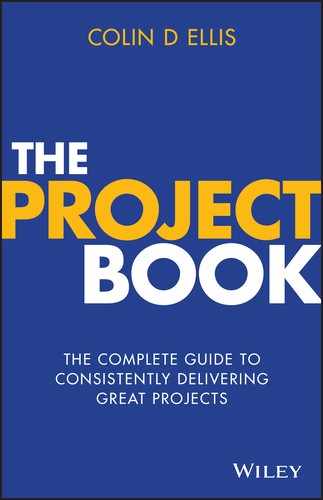CHAPTER 13
MAKE GRATITUDE YOUR ATTITUDE
A 2017 Gallup survey found that just 3 in 10 workers in the US feel appreciated by their employers, indicating widespread disengagement. People spend as much time at work as they do at home with the people they love (sometimes more). To spend it in an environment where you don’t feel appreciated for what you do is appalling. Apparently we need a day — the first Friday in March, Employee Appreciation Day — to remind us to do it! It’s like Valentine’s Day but with cheaper flowers.
Gallup estimated that these disengaged employees cost US business between US$483 billion and $605 billion every year. In short, where staff aren’t given opportunities to share their ideas, or their work isn’t consistently acknowledged and appreciated, a significant impact on the bottom line can be expected.
The same is true of projects. Poor project management almost inevitably leads to the team either losing interest or working around the project manager to get things done. In both cases, schedules will slip and costs will rise.
One very simple way to help avoid this is by saying thank you, merci, gracias, danke, dank u, grazie, dōmo arigatō, kamsahamnida, obrigada, dhanyawādāh or dankie. One or two simple words that make a world of difference. Parents teach their children early to say please and thank you, but this simple courtesy is sometimes lost by the time they start their working life.
Project leaders don’t do any of the real work, of course. It’s your job (for the most part) to ensure you build a team of people with the right skills and behaviours. So your principal form of communication should be the one that shows gratitude for the work done, even if you’re not too happy with the outcome (‘Thanks for the effort you’ve put into this, but this isn’t the approach we agreed on’).
Project leaders take the time to show gratitude in a range of different ways — some personal, others for the whole team or for individuals who have gone above and beyond what was expected of them. Ways you can show gratitude include the following:
- Verbal. Simply look them in the eye and say thank you. How hard can that be? If it’s in a group situation, take care you don’t embarrass them. Whole Foods in the US has an ‘Appreciations’ agenda item in meetings to reinforce the importance of gratitude.
- Email. Send an email to the team calling out the work of one or more individuals, taking care not to alienate others.
- Note. Write a brief thank you on a sticky note or similar and stick it on their screen.
- Card. You don’t have to wait until someone’s birthday or Christmas to send them a card saying thanks.
- Coffee/lunch. Consider this an extension of the verbal thank you, but also a ‘reward’, to be paid for out of your own pocket, to show your appreciation.
- Something more personal. Once you get to know your team members you can buy them a gift you know they’ll like. Movie or shop vouchers are lazy, unless of course films or shopping are what your team particularly enjoy!
In his excellent book Emotional Capitalists, Martyn Newman says, ‘Leaders who treat people in a way that supports their self-confidence make it possible for people to achieve things they initially thought impossible’. Make gratitude your attitude today and watch the confidence of your project team grow.
